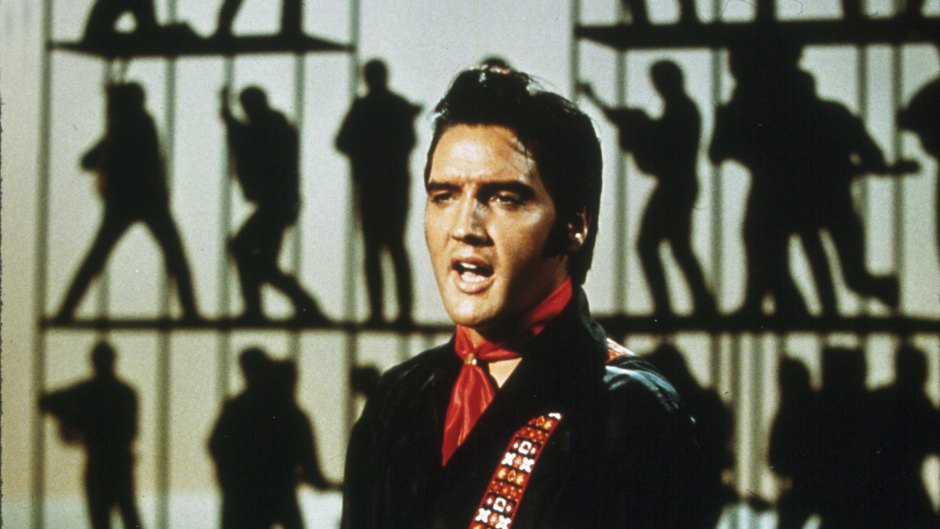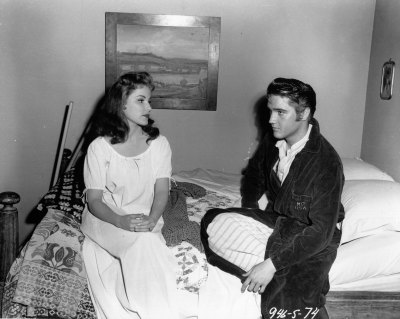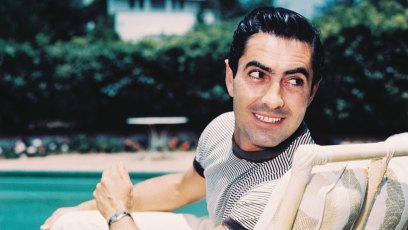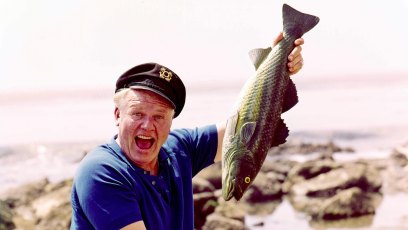
Snap/Shutterstock
Elvis Presley’s Movie Career — The Truth About the King’s Hollywood Hits Revealed
While ex-wife Priscilla Presley and daughter Lisa Marie Presley are still making headlines, unsurprisingly Elvis Presley remains prominent on people’s minds. Whether it’s the new animated series Agent King that reimagines him as a secret agent or his legacy of music and, in this case in particular, his films, Elvis is everywhere.
When it comes to his movies, there’s a perception that for the most part they’re dismissible, formulaic and completely superficial. There’s the other side of the argument, however, that without them we wouldn’t have nearly the amount of music that we have of Elvis, which in many instances was precisely the point. To be sure, these films were created to get butts into theater seats, but, even more importantly, they were geared towards selling soundtrack albums, which in many instances were far more profitable. Not that this was a new approach taken to a popular singer.

“There was a tradition going all the way back to Al Jolson in the early pop era,” explains Susan Doll, author of, among other books, The Films of Elvis Presley. “A tradition of pop singers already having an image, because they were already a performer, then showcasing that image in a series of films and sometimes fine-tuning that image in the films. That was kind of the tradition of grooming a popular singer into the movies. So there was Jolson, there was Bing Crosby, and there was Frank Sinatra. Even the opera singer Mario Lanza, who was very handsome and very masculine, Hollywood tapped into. They created a series of vehicles to showcase him. Elvis was a big fan of Mario Lanza, and he also really followed Sinatra’s career. In his mind, when he was being courted for the movies, that’s how he saw his career going in terms of becoming an actor: Using his singing popularity and then filtering that into an acting career.”
Please scroll down for much more on the films of Elvis.
Be sure to check out and subscribe to our Classic TV & Film Podcast for interviews with your favorite stars!
1 of 25

Michael Ochs Archives/Getty Images
A Fascination With the King
Just as it was Susan’s interest in Elvis and film in general that filtered into not only her career as an author but as a Professor of Film Studies at Ringling College of Art and Design, specializing in the Golden Age of Hollywood.“I’ve written several books on Elvis over the years,” she explains, “but the starting point is that Elvis was the subject of my dissertation at Northwestern University. The point of the dissertation, because I got a degree in Pop Culture and Film Studies from there, was how his career was managed based on specifically controlling a star’s image. At the time, there was nothing scholarly written on him; not even a definitive biography. It was still in the era, I think, of the first 10 years after his death and there were very few serious pieces about him. A lot that was out there were bios by people who had worked for him, or bios by people who were sensationalizing the ‘he died of drugs’ thing. And people were in shock that he’d had a drug-related death.
2 of 25

Getty Images
“There was this battle for the first few years after his death of he was a drug addict versus he was not a drug addict,” Susan continues, “and that kind of really got in the way of any kind of assessment of his contribution to pop culture. So I got into looking at his career after a documentary came out called This is Elvis, and I saw how orchestrated his career had been. As I started looking into it, I discovered there was a lot of planning and control over his career once he became famous. How that occurred and why that occurred was the subject of my dissertation, and I was just lucky enough to get a deal for a coffee table book that was a positive depiction of his contribution to culture. Then I kind of got a little bit of a reputation for writing positively about Elvis, and that let to other types of books.”
While her book may have taken a positive slant towards the Elvis movies and helped paint the picture that they represented a wonderful period, the truth was a little bit different. “No,” she says, “they weren’t all wonderful.”
3 of 25

Hulton Archive/Sunset Boulevard/Corbis via Getty Images
Enter Producer Hal Wallis
By the time Hal B. Wallis entered Elvis’ life, he had certainly established himself as an A-list producer in Hollywood, his credits including The Adventures of Robin Hood (1938), Casablanca (1942) and True Grit (1969). “A lot of people like to put anything bad that happened to Elvis’ career, especially in regards to the movies, on the shoulders of the Colonel — ‘It was the Colonel who made him make all those bad movies, blah, blah, blah,’” Susan offers regarding Elvis’ manager, Colonel Tom Parker. “I would say the person who tailed Elvis so tightly and squeezed him into a very specific star image, would be Hal Wallis because that was his specialty. He’s really one of the best producers to ever come out of Hollywood, beginning with the studio days at Warner Bros. He did these A-list movies, and his specialty was to understand a star’s image. That was the lifeblood of Hollywood in the Golden Age where all films were cast based on the pre-existing image of the stars. And grooming a star to have a specific image. Wallis was very good at that.
4 of 25

Snap/Shutterstock
“In the ‘40s,” she elaborates, “Wallis was one of the first producers to go independent at the studio. He forms his own production company and releases through Paramount, but he begins to sign stars to him under personal contracts and groom them based on their star image. He’s the one that gave Dean Martin and Jerry Lewis their break by fine-tuning their nightclub act and turning it into this kind of comedy team image for them in Hollywood. He sees Elvis on television in ‘56 and the way the studio audience goes crazy for him, and he wants to tap into that popularity. So he signs Elvis for a three-picture deal. And the first thing he did was loan him out to 20th Century Fox for Love Me Tender. He said at the time he didn’t have a property for Elvis, but in the back of my mind, I think he was testing Elvis’ ability to attract a crowd without having to put out any effort himself, which is why he loaned him out. Then, after Love Me Tender was such a big hit because of Elvis, Wallis went to work.”
5 of 25

John Springer Collection/CORBIS/Corbis via Getty Images
The Importance of ‘Loving You’
Elvis second film was 1957’s Loving You, of which, says Susan, “I’m in awe of the control and deliberate approach to the film in terms of making Elvis a big star, because essentially what this film is, is a fictionalization of the Elvis story. It’s not a biography, but it’s the story of this singer with a new sound. His name is Deke Rivers, which is kind of an unusual name, just like Elvis is an unusual name. So Deke has a new sound and attracts a young crowd, and he’s misunderstood. He seems like he’s rebellious and angry, but really he’s just misunderstood. So he finds the right girl and becomes a better person. He begins his career as a Country-Western singer, which is what Elvis did, and then his ruthless manager enters, who is kind of like the Colonel — except that it’s Lizabeth Scott in the movie, trying to manipulate or exploit him, and then realizes he’s really just a nice kid. By the end of the film, you’ve essentially told the Elvis story and given the spin that, you know what, this is really a good kid who just happens to have a new sound and it’s kind of spinning the controversy surrounding Elvis.”
6 of 25

GAB Archive/Redferns
Spinning Reel Life Into Real Life
Of Loving You, Susan adds, “So you have the Elvis persona in this character, but you’ve spun it to make him okay. You know, ‘Oh, he’s really not the bad guy that the press says he is.’ There’s these little markers throughout the film to remind the audience that this is a stand-in for Elvis. At one point, someone makes fun of him by calling him ‘Sideburns.’ That was something that seemed almost ludicrous to the press at the time; they were fixated on his long sideburns. Why would he have them? Well, they’re a signifier that he never washes his hair, and only working class truck drivers have sideburns. Why does he have them? And then, everything that was bad about rock and roll, they would attribute to some side-burned singing teenager. So somebody in the movie pikes fun at him because of that. Another point, the manager buys him a Cadillac for doing well, and then there’s a scene where these girls discover it’s his car and they sign it with lipstick. Which happened to Elvis repeatedly. When he was on the road, if they discovered it was his car, then they would virtually ruin the paint job by scratching their phone numbers and writing on it with lipstick. So there were these little markers to remind you that you’re really watching Elvis, but, gosh, it’s a fictional character. A kind of controlled way to give you Elvis, but also twist the character to show he’s a nice, misunderstood kid so you soften the bad publicity that was swirling out there at that time.”
7 of 25

RB/Redferns
‘Dancin’ to the Jailhouse Rock’
Loving You fulfilled its mission of changing people’s perceptions of Elvis to a more positive one while becoming a box office and soundtrack hit. “Because Elvis’ schedule wasn’t exclusive, and as long as it didn’t interfere with Wallis’ schedule, other studios could sign him,” notes Susan. “With Jailhouse Rock, MGM took the same strategy. You know, here’s this kid who’s been in trouble, he’s controversial, he’s been in jail, but he has this great new singing style. He might be rough around the edges and rebellious, but he’s really just misunderstood. He finds the right girl and, in the end, he’s a changed person. Kind of the same idea.”
8 of 25

Paramount Pictures/Getty Images
‘King Creole’ — Possibly Elvis’ Best Movie
For Susan, the next film, King Creole, is probably, “objectively speaking,” his best film, which was another Hal Wallis production. “It was originally a film about a young boxer in New York that was to be played by Ben Gazzara,” she details, “and that fell through. Wallis had someone rework it as a vehicle for Elvis; the character became a singer with a new sound, and it was set in New Orleans. There’s more story that doesn’t have anything to do with Elvis. The kid’s background is not quite as specified as it is in Loving You or Jailhouse Rock, but it’s still in that trope of a young kid with a new sound being misunderstood. Once he is understood and his problems are solved, then he’s just a regular kid like everyone else. It just happened to be done with a really good production value. Directed by Michael Curtiz, who directed Casablanca, and it had a great supporting cast: Walter Matthau and Carolyn Jones (Morticia on The Addams Family), and she and Elvis had a really good chemistry. Great cinematography and great music by Keiber and Stoller.
9 of 25

Universal History Archive/UIG/Shutterstock
“So that was the beginning of his film career, and the way the films were used to tone down the controversy over him in the press and to just present him as a regular guy. And there was always that rags to riches show business story that had been a part of Hollywood for a long time, so it kind of fits into that genre as well. The way that they spun his films in the ‘50s is they took his specific situation and fit him into standards and tropes and conventions that the average moviegoer would be familiar with.”
10 of 25

Getty Images
Frank Sinatra’s Acting Career Was An Inspiration
Elvis was pleased with the way his film career was going on, but all along he held the aspiration to be seen more as an actor than a singer who appeared on screen. “He had wanted to follow the Frank Sinatra model,” Susan points out. “Remember, when Sinatra did From Here to Eternity, where he didn’t sing at all, that was like a big comeback for him. And after that, he made mostly dramatic films. Even Bing Crosby in the ‘50s makes things like The Country Girl, where he’s not singing and he’s a dramatic actor. Elvis looked at those models as what he wanted to do: ‘I’m gonna use my image and popularity as a singer and parlay that into a career as an actor.'”
11 of 25

Moviestore/Shutterstock
“By Hollywood standards, there was nothing wrong with Elvis’ career. Hollywood standards are you make money and then that enables you to make the next film, so if you go by that standard, which the Colonel and Wallis and his agent at William Morris were going by, everything was going great. In terms of the quality of his films, the turning point was Blue Hawaii in 1961.”
12 of 25

Getty Images/Getty Images
Private Elvis Presley
Elvis’ film career was sidelined when he was drafted into the U.S. Army, where he served from 1958-60. “There could not be a better publicity situation than him going into the Army and just sucking it up and being a regular soldier,” explains Susan. “He was drafted and different branches of the military offered him the opportunity to go into Special Services, where he would entertain the troops at bases around the world, but he didn’t. He went into the Army and was just a regular soldier in Germany in the tank division. Because of his fame, he was allowed to live off base, but he would go on maneuvers in the cold and all that crap just like everybody else did. Everybody here said, ‘Well, that will be the end of Elvis’ career. He’ll be out of the limelight for two years.’ But the Colonel was a very smart man, and there’s a reason why Elvis was incredibly loyal to him his entire career.
13 of 25

United Artists/Kobal/Shutterstock
“For two years, the Colonel worked his ass off keeping Elvis in the spotlight, just kicking out this publicity and taking advantage of him being in the Army, proving that he’s not this rebellious teen who smokes pot and shoots his mother (as one rumor had it). Instead, this is a kid who served his country and is glad to do so. There was a lot of publicity about him getting his hair and those ‘damn’ sideburns cut off to go into the Army. All of that was photographed and on the news. It starts to change people’s minds about him and the bad publicity starts to be forgotten and is replaced by positive publicity. He also made sure that some of Elvis’ songs were in the can so that they could be released during that time frame.”
14 of 25

ABC Photo Archives/ABC via Getty Images
Welcome Home, Elvis
And there was as much publicity about Elvis returning from the Army as there was for him going, especially with a special episode of The Frank Sinatra Show that heralded the fact that he was back. “That was in the days when one company would do all the ads for the entire hour,” Susan emphasizes. “I think it was Timex that contracted Sinatra to do a series, because Sinatra was not singing in the movies anymore, right? For the most part, he’s doing dramatic parts. There are a couple of exceptions, but that’s where he wants to go. But he sings on television to keep that part of his persona going, so he’s in these TV specials, and one of them was devoted to welcoming Elvis back home from the Army. It’s Frank Sinatra and Sammy Davis Jr. and Joey Bishop. Nancy Sinatra was there to represent the younger generation. And in the first segment, Elvis comes out in uniform and sings some of the new songs he’s just in the process of recording. Then he does a segment where he’s dueting with Sinatra, with Sinatra singing a couple of Elvis songs in his style, and Elvis singing a couple of Sinatra songs in his style. So it’s all about the optics of mainstream television embracing Elvis.”
15 of 25

Hulton Archive/Getty Images
Things Start to Change in Hollywood for Elvis
Elvis’ first film after returning from the Army, G.I. Blues returns to a bit of the tried and true formula. Susan says, “Hal Wallis again does that thing where he minimally refers to something that happened in Elvis’ real life: he plays a G.I. who’s just getting out of the Army and hopes to go into show business. In the Army, his character was in the tank division just like Elvis was in real life. That was just a minimal amount of biography of the character aligned with Elvis, but it was enough for the fans to see that the character was really Elvis. And, to soften them even further, there were a lot of changes that occur in the Elvis image once he comes out of the Army. If you watch that film, for instance, there are no sideburns. He would not have sideburns again until the 1970s when he stopped making films. Also, the music is more pop and less rock, and in this particular film, he sings in a puppet show to kids. That was really going to broaden and soften the rock ‘n’ roll rebel image.”
16 of 25

Sunset Boulevard/Corbis via Getty Images
Going More Dramatic Doesn’t Pay Off
In 1960 and 1961, Elvis pushed to go in a more dramatic direction with, respectively, Flaming Star and Wild in the Country. The singing is kept to a bare minimum and is only there at all because of studio insistence. “Unfortunately,” Susan points out, “those films didn’t do as well at the box office, so he goes back to the musical comedy film with Blue Hawaii and it pretty much sets the formula: Elvis is the handsome leading man who is not inclined to get married, but he finds a girl who really wants to settle down, so the plot is about how is she going to land Elvis? How is Elvis going to end up with her at the end? He often has an occupation that is not a mundane 9-to-5 job. He starts his own tourist company or something. And it’s huge. It becomes his biggest hit, the soundtrack is his biggest selling album. So his management team — Wallis, the Colonel and the William Morris Agency — were, like, ‘Well, look, this is what your fans want. Look at the numbers for Blue Hawaii compared with when you tried to become a dramatic actor.’ And that was the point, and what people learn is that their film with Elvis will make money even if you don’t put that level of production value in it. So when he starts to make films for outside the Wallis deal, they low ball those things and still make money. And that’s where they become less charming and more formulaic.”
17 of 25

GAB Archive/Redferns
Putting His Faith in the Colonel
With Elvis’ success on screen and in music, it would seem that he would have had the clout to insist on better quality scripts and production values on his films, which makes one wonder why he didn’t. “I think it was a combination of things,” Susan muses. “One was that he had been managed by the Colonel since he was a teenager, and the Colonel was right more than he was wrong. He maneuvered Elvis through the horrible era in the ‘50s in terms of bad publicity, and he was able to make Elvis an even bigger star after being out of the public eye for two years. That was a phenomenal feat in and of itself, comparable to when, during World War II, people like Jimmy Stewart and Clark Gable, who were incredibly established stars when they went away for two years and came back and were stars again. Elvis had only been around a little while and the Colonel managed to keep him on top. And to maneuver him into a film career, which he had wanted. So he was like a father figure. I think in terms of his personality it would have been hard for him to question that.
18 of 25

Paramount/Kobal/Shutterstock
“The second thing is he is having a lot of fun during this period. He has the money he wants, he has a group of friends around him, and they have a lot of fun. They travel together, they go horseback riding together, they go motorcycle riding together. He’s in the Hollywood scene and he’s dating all these starlets. So there’s a level of fun off camera that he’s having to the point where I don’t think his mind was on, ‘Gee, I wonder how bad this movie really was.’”
19 of 25

Michael Ochs Archives/Getty Images
The Start of the Nine-Day Specials
Following Blue Hawaii, Elvis shot in rapid order Follow That Dream, Kid Galahad and Girls! Girls! Girls! In 1962; It Happened at the World’s Fair and Fun in Acapulco in 1963; Kissin’ Cousins, Viva Las Vegas and Roustabout in 1964; and Girl Happy, Tickle Me and Harum Scarum in 1965. Two films in that mix signaled a change in Elvis’ attitudes about his movie work. “Harum Scarum and Kissin’ Cousins were produced by Sam Katzman,” says Susan, “and they are, like, nine-day specials. Made super fast, really lousy music, just absurd storylines that have no grounding in the way that people relate to each other. In Kissin’ Cousins, it’s actually a very negative depiction of people in the South, which did not go over very well with him. And he plays a dual character in that, a mountain boy who looks just like a long lost cousin in the Army. That was when I think Elvis felt really defeated.
20 of 25

Snap/Shutterstock
“The thing that saved him is that Priscilla, his relationship with whom had started during the Army when she was very young, was getting older and they’re thinking about getting married, so he focused on that. He also records, I believe, a gospel album around ‘66 or something like that, so he was able to put his creative attention on that. He was a big lover of gospel music and was really good at it. So he was able to divert his attention elsewhere, away from the ‘day job,’ so to speak.”
21 of 25

GAB Archive/Redferns
Elvis Has Had Enough!
A dozen films starring Elvis were released between 1966 and 1969, one usually worse than the last. He’d wanted out earlier, but was still under contract with Hal Wallis and other low-rent production companies the Colonel had made deals with. He has no choice but to proceed with them, but it finally became crystal-clear to him how he was being used. “By that time, Wallis is older and he’s just using the Elvis movies to make money,” notes Susan. “One of the final straws was Roustabout, which is actually a decent film. Wallis used the money from Roustabout in order to have the equity to make Becket with Peter O’Toole. Becket bores me to distraction, but it’s one of those Oscar bait movies at the time starring Peter O’Toole. It doesn’t age very well. But at the time it won an Academy Award nomination and it was highly-touted in the press. Wallis talks about how he was able to build equity in his company to make Becket because of what he makes on the Elvis vehicles. That’s when it dawned on Elvis that Walls was never going to star him in a quality production.
22 of 25

Moviestore/Shutterstock
“It just kind of hit him that he was being used, and he doesn’t sign with him again. Ironically, though, he does try to do a couple of things that are really different. At the every end he makes a western called Charro in the style of the Spaghetti Westerns, like Sergio Leone’s films with Clint Eastwood, but it was a lousy director and wasn’t very good. But then he makes a drama, costarring Mary Tyler Moore, called A Change of Habit. He’s a doctor in the ghetto and there are all of these social messages in his dialogue about poverty and crime. Just something heftier than you would find in previous Elvis movies.”
23 of 25

Sunset Boulevard/Corbis via Getty Images
Elvis’ Film Legacy
Generally speaking, when one looks back at the Elvis Presley filmography, the impression is not generally a positive one. Susan believes there are two reasons for this: “One, is Elvis himself. When he gets back on the road again in ‘69 and into the ‘70s, he will make fun of himself and call his body of work ‘The Presley Travelogues’ as a way to disparage them. Like I said, they had this formula of exotic locale and a handsome leading man with an unusual job and a real fantasy approach to romance. And then, the first people to seriously try to put his contributions in perspective in the ‘80s were music writers and, of course, music historians or music critics are going to hate the movies, because he changed his recording style and he changed his image in order to fit into the mold of the Hollywood leading man. So they immediately think that that’s a step downhill, because he’s not playing rockabilly anymore. Between those two things, that accounts for why his movie career is made fun of so much.
24 of 25

Mgm/Kobal/Shutterstock
“The positive impact for him of having done those films is the fact that he reached more fans, and he was always grateful to his fans. This gave him a wider and broader fan base. And it allowed him a lifestyle to which he was accustomed. Now there were times when he felt isolated by that lifestyle, but there were also advantages to it that I don’t think he would have been able to live without once he got used to them, to be honest.”
25 of 25

Sunset Boulevard/Corbis via Getty Images
Final Thoughts
“The worst part of his making those films,” closes Susan, “would obviously be when he realized that he would never escape those vehicles. He kept waiting for that serious movie for Wallis to cast him in. Like King Creole was a really good, serious movie, and he just kept waiting — and believing — that they would come back from Wallis, and Wallis never had any intention. Once he could make a certain amount of money on a certain kind of vehicle, he had no intention of pulling Elvis out of that. I think when Elvis realizes that over the Roustabout/Becket thing, that’s when he becomes bitter toward Hollywood. That personally affected him deeply, and he simply stopped trying. He felt like the guy he trusted let him down and was using him, and it simply wasn’t something he could handle anymore.”








































